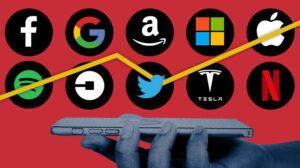Last Updated on 17/10/2021 by Khushi
Image courtesy: theatlantic.com
Five bills have been introduced in the United States by lawmakers to limit the power of Big Tech companies. The legislation was created following a 16-month investigation into the powers of Amazon, Apple, Google, and Facebook.
They discuss topics such as data, mergers, and these companies’ competitive behaviour, which may eventually force them to sell some assets.
However, the bills aimed at Big Tech do not have unanimous support.

Image courtesy: Financialtimes.com
“Bills that target specific companies, instead of focusing on business practices, are simply bad policy… and could be ruled unconstitutional,” US Chamber of Commerce President Neil Bradley said in a statement.
Before being sent to the House floor, the bills will be referred to the House Judiciary Committee.
The bills’ co-sponsor and Democratic chair of the Antitrust panel, David Cicilline, tweeted a breakdown of the legislation, which he says will “strengthen our laws to hold tech monopolies accountable, and build #AStrongerOnlineEconomy.“
The bills, which have received bipartisan support, are as follows:
The American Choice and Innovation Online Act prohibits businesses from using marketplaces to promote their own products.
The Platform Competition and Opportunity Act of 2021 – this bill makes it more difficult for businesses to acquire and eliminate competitors.
The Ending Platform Monopolies Act prohibits Big Tech monopolies from selling products in marketplaces controlled by them.
The Augmenting Compatibility and Competition by Enabling Service Switching (ACCESS) Act of 2021 enables you to leave a social media platform and take your data to a competitor.
The Merger Filing Fee Modernization Act of 2021 – This bill provides the Department of Justice and the Federal Trade Commission with the resources they need to police monopolies at no cost to taxpayers.
“Big Tech’s unchecked growth and dominance have lead to incredible abuses of power that have hurt consumers,customers, small businesses, and innovation,” said Robert Weisman, president of the consumer advocacy group Public Citizen.










